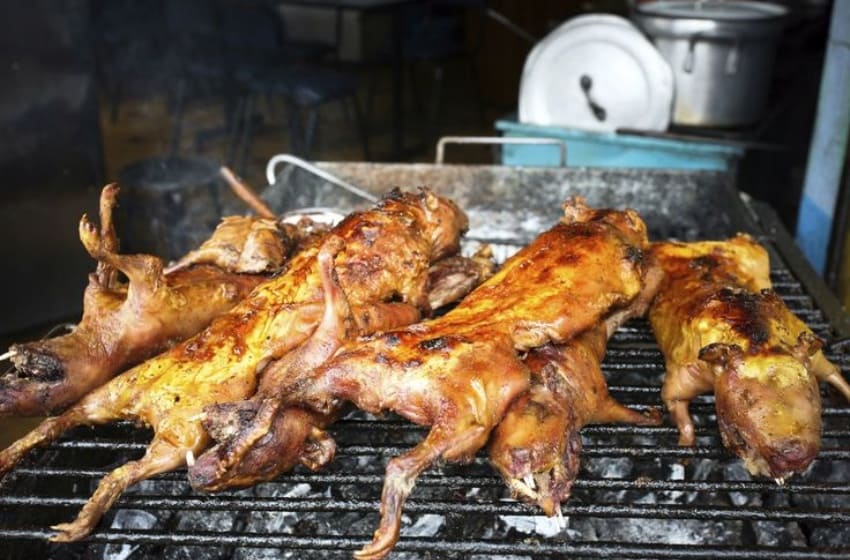
The beauty of Peruvian cuisine not only lies in its exquisite taste. It has incorporated influence from various cultures and times. Peruvian cuisine dates back to Incas and pre-Incas, including food like potatoes, maize, and spices.
The influence of foreigners like Spanish, Asians, and Africans also led to the arrival of many other different foods. Therefore, Peruvian cuisine has resulted in an evolving culinary tradition recognized globally, and one famous recipe is the cuy food (Peruvian guinea pig).
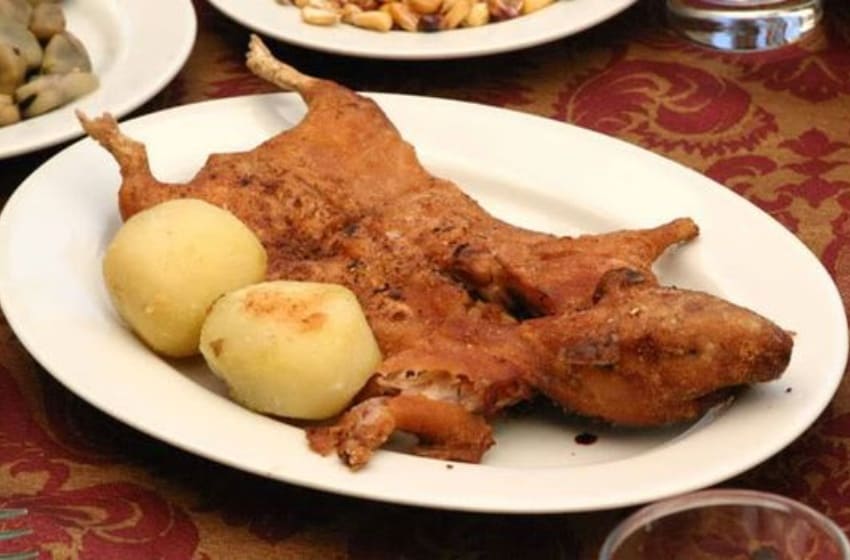
Image source: Pinterest
What Is a Cuy Meat?
The Peruvian guinea pigs are cuddly, furry, and small. Cuy is a rich, oily meat most people akin to ducks. It has almost similar taste and texture to a duck. Its flavor is a mix of chicken and rabbit with some gaminess.
Once, I visited Cusco and went to a restaurant there. I ordered the Andean cuy and started eating it with a fork. Everyone looked at me with confused looks. Later, I learned that using your hands is the standard way to eat cuy. Ensure you have a napkin ready since this delicacy can get messy!
The ancient Inca civilization recorded the first cuy in the Andes mountain range in South America. The Inca people kept these guinea pigs for food. The guinea pigs in the United States and the Andean cuy look the same. However, the Andean cuy is larger.
Most people, including me, often confuse cuy with a rabbit due to their similar appearance. However, you can differentiate the two by the size of their ears. The cuy has smaller button ears, while rabbits have very long ears. In addition, rabbits hop while cuyes scurry. Furthermore, rabbits belong to the Lagomorpha order, while cuy belongs to the order of Rodentia. The good thing about cuy is that you can serve them as a whole and on a spit.
In Peru, cuy has a significant nutritional value. It provides a low amount of fat and a high amount of protein. It also contains high amounts of iron, zinc, and vitamin B12.
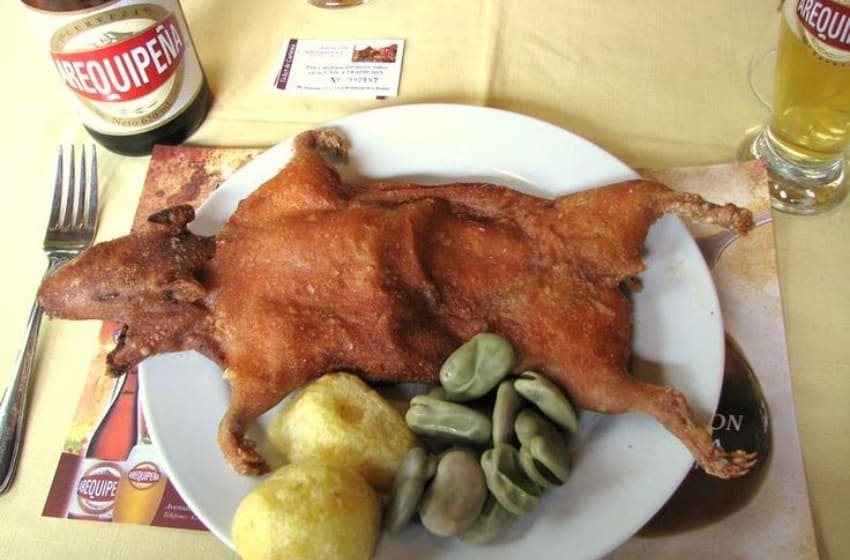
Image source: Pinterest
The Peruvian Guinea Pig’s History and Cultural Significance
In Peru, they call guinea pig cuy. In addition, Peruvians don’t have guinea pigs as pets. They are more like domesticated rabbits. Andean cuy are rich in proteins and delicious.
During the pre-colonial period, cuy was an essential part of the diet. According to scholars, the Incas domesticated the cuy for more than 5,000 years. Furthermore, priests used them to predict the future and also employed them as sacrifices.
The name of the animal came from the sound that it makes, “Kew, Kew.” The Peruvians valued this animal to the point that every second Friday of October became a national holiday to celebrate it. Apart from its delicacy, the Peruvian cuy also plays a cultural role, which includes the following:
- Symbol of Prosperity
Peruvian culture views cuy meat as a symbol of good luck and prosperity. Most families occasionally roast the Peruvian cuy pig to indicate good fortune and abundance.
- Culinary Contests
The popularity of cuy in Peru has risen to the point that there are contests solely aimed at creating innovative cuy dishes. These competitions showcase new, exciting, and creative ways of preparing cuy.
- Cultural Responsibility
Despite cuy consumption being a firm tradition in Peru, people know they need responsible practices. Peruvians make an effort to ensure they balance ethical considerations and cultural heritage.
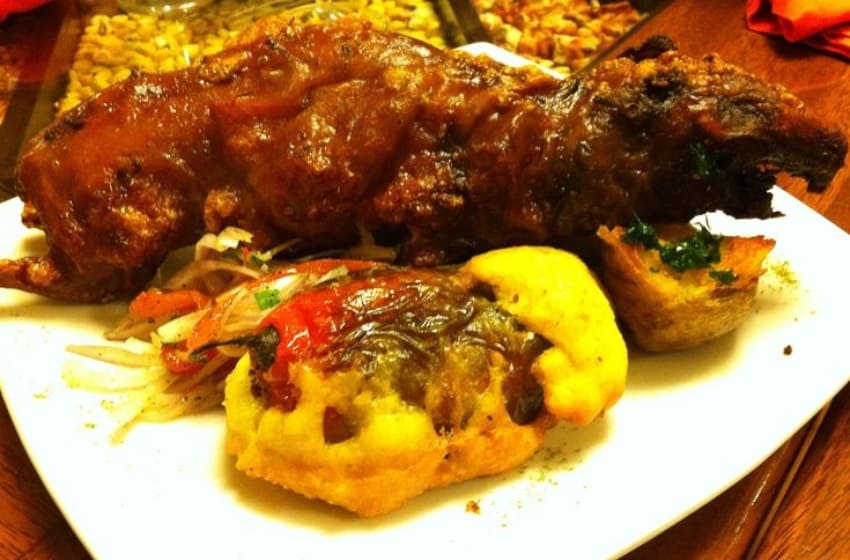
Image source: Pinterest
Procedures for Roasting Your Peruvian Cuy
The Peruvians call the recipe involving roasting a cuy on a stick Cuy al Palo. Most of the people in the rural communities of Peru use this method since they do not have an oven, especially in the villages. Here are the steps of roasting a cuy:
Ingredients
- Huacatay
- Pepper
- One onion
- Cuy
- Garlic
- Lemon
- Salt
- Cumin
- Oil
- One piece of wood
- Cilantro
- Two tomatoes
- Chili Rellenos (stuffed chili)
Preparation
- You will start by preparing the cuy. You will first remove the hair using hot water. If there is any remaining hair, use tweezers to remove it. Afterward, thoroughly clean the internal organs of the cuy.
- After the cuy is ready, you will prepare the seasoning. Mix oil, cumin, garlic, salt, pepper, and huacatay separately. The huacatay gives the cuy a unique taste.
- Once the seasoning is ready, marinate the cuy. You will use the prepared seasoning to cover the whole inside and outside of the cuy. You will then leave it for at least 1 hour.
- After one hour, skewer the cuy and grill on fire. Ensure you repeatedly turn the stick until it is crispy.
- Once your cuy food is ready, prepare some salsa for it. Slice your onions and tomatoes, add lemon and coriander, and add salt to taste.
Are you like me, who does not like roasting your cuy on a stick? You can always bake it using an oven instead. It’s the same procedure as above; the only difference is that you will bake it in an oven for an hour instead of using a stick.
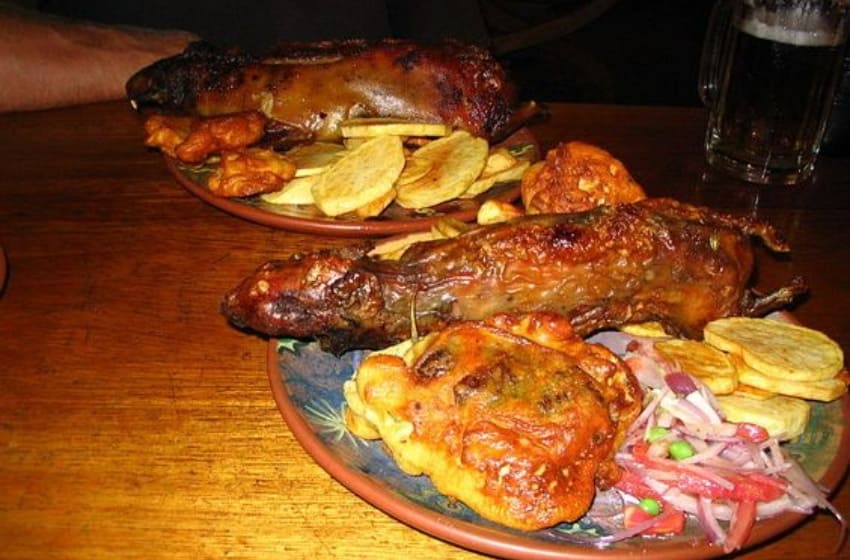
Image source: Pinterest
Side Dishes That Compliment Roasted Cuy
Looking for extra side dishes to compliment your cuy? Look no more. Below, I have some ideas for you:
- Aji Amarillo Sauce
Do you know the key ingredient that makes this sauce? Peruvian yellow chili pepper! In Peru, almost everyone uses this sauce in their cooking. You cannot resist Aji Amarillo sauce’s unique, fresh, and fruity flavor. It will perfectly complement your delicious roasted Peruvian cuy.
- Salsa Criolla
Salsa criolla, the name Peruvians call this salsa, has a similar preparation to salad but contains a more intense flavor. It is the cross between mojo and salad. Peruvians add it to their main dishes in small amounts to enhance flavor instead of eating it as a salad. It contains lime, chili pepper, oil, coriander, vinegar, and red onions. You can best serve it with roasted meat such as cuy.
- Peruvian Stuffed Avocado
Do you want a creamy, delicious, healthy side dish for your roasted cuy? Nothing beats Peruvian stuffed avocado. Even though there are no rules about what you will load your avocado with, mayonnaise and lime juice complement the avocado’s healthy fat. This starter can go perfectly with a roasted cuy.
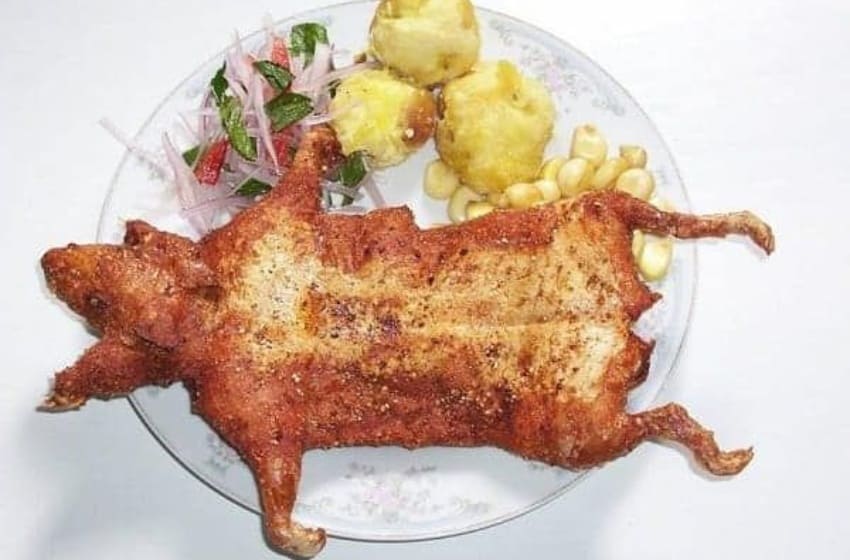
Image source: Pinterest
Conclusion
Since you now know the cuy Peru origin, you should appreciate its role in Peruvian culture. Is there anything stopping you from making the delicious cuy Peruano? For my wife’s next birthday, I will follow the above guide for roasting a cuy and surprise her with this roasted Peruvian delicacy.





